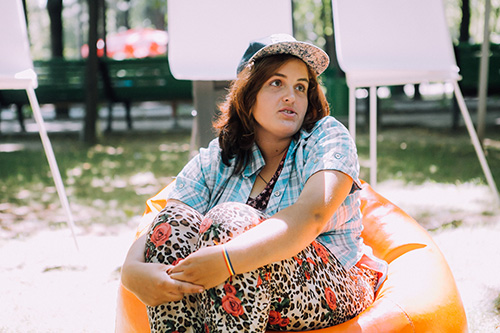News
Girls call for tearing down gender barriers in Republic of Moldova
- 01 August 2016
News
CHISINAU, Republic of Moldova – “My biggest dream is to be healthy, to have a successful career and to have a family,” said Alexandrina, a 16-year-old girl from Helesteni, Nisporeni.
These dreams are shared with thousands of other teenage girls in the Republic of Moldova. Yet discriminatory attitudes remain widespread in the country, leaving many girls pessimistic about what they can achieve.
“I feel that if I were a boy, I would have more possibilities to find a stable and better employment,” 14-year-old Amina told UNFPA.

Sadly, her suspicions are well-founded.
Research conducted in 2015 by the Women’s Law Centre found that over 90 per cent of men and over 81 per cent of women in the country believe that domestic chores should be a woman’s primary responsibility. Sixty per cent of both men and women believe that when a woman is given a job, she is taking a position meant for a man.
“In Moldova, the women are more engaged in housekeeping and taking care of the children, while the men are expected to gain money for the family,” Alexandrina explained.
These attitudes also reveal themselves in darker ways: 41 per cent of men surveyed say there are times when a woman needs to be beaten. Nineteen per cent of women agree.
Girls are not the only ones facing challenges in the country.
Young people more broadly are grappling with high levels of unemployment. They also have limited exposure to sexual and reproductive health information, and have limited access to quality health-care services. Many engage in risky behaviours. Only about a third of young people have comprehensive knowledge about HIV, according to a survey of youth aged 15 to 25.
And they are too often left to deal with these challenges alone. According to some estimates, about 100,000 children in the country have been left behind by migrant parents.
One important step forward would be sexuality education in schools – something called for in a reproductive health law adopted in 2012, which has not yet been implemented.
Comprehensive sexuality education enables young people to protect their health and futures by preventing sexually transmitted infections (STIs) and unplanned pregnancies. It also includes messages about human rights and gender equality, encouraging students to re-examine their assumptions about gender roles and gender-based violence.
UNFPA is working to ensure age-appropriate comprehensive sexuality education is included in the country's school curriculum.
And UNFPA also supported the scale-up of Y-Peer Moldova, a youth networking programme that is increasing young people’s access to sexual and reproductive health information. There are some 300 Y-Peer trainers in the country who regularly hold education sessions for young people, teaching them about their bodies and how to keep themselves safe from STIs and unintended pregnancies.
Y-Peer also empowers youth by helping peer educators – both boys and girls – gain leadership experience in their communities.
UNFPA is also supporting a network of 37 youth-friendly health centres, which provide young people with counselling, information, family planning and medical services, helping young people to make informed decisions about their sexuality and health.
And, for now, there are hopeful signs that attitudes about girls may be changing.
“We have to offer [girls] access to quality education,” one resident of the capital city, Chisinau, told UNFPA. “We have to make many efforts in order to ensure that teenage girls can become businesswomen one day, and – why not – mothers."
– Ganna Iovchu